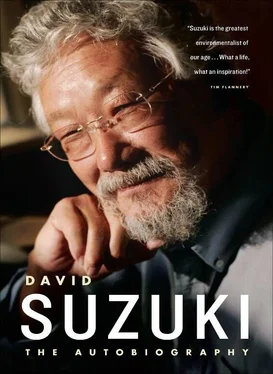The brainstorming participants were outspoken and irreverent, leading to vigorous, productive sessions. We agreed that most organizations we knew had sprung up as a result of a crisis — to oppose the spraying of a school yard with herbicide, to fight a factory polluting the water, to protect a treasured forest about to be clear-cut. But each crisis is merely a symptom or manifestation of a deeper, underlying root cause. Even if each crisis is resolved, we are no closer to long-term balance with our surroundings unless we get at the cause. An organization was needed to focus on root causes, so that steps could be taken to produce real change.
We agreed it should be a science-based organization. We would not do original research or give out research grants, but we would use the best scientific information available and hire scientists to help write or edit the papers we wanted to produce. Further, we would emphasize communication: we would learn how best to deliver this top-quality information to the public. Successful communication would be as important as the science itself. I have always believed this, which is why, as a scientist, I chose to go into television.
At the meeting on Pender Island, we also decided not to accept government grants or support — a decision that had enormous ramifications. Such support can become a substantial part of an organization's budget. But government priorities change easily; organizations are often told they could qualify for further grants if they would just shift their focus — and before anyone realizes it, the promise of continued funding is directing activities. We also decided that if companies offered us money, they would have to demonstrate a genuine commitment to environmental sustainability before we would consider accepting funds.
In the early days of the organization, the decision to abstain from government support made life difficult. We could have had several employees paid by Canada Manpower (the federal employment insurance system at the time) and grants to help us get up and running, but we chose to use only the money Tara and I were putting in. We stuck to that decision, and it gave us the freedom to speak out without worrying about jeopardizing our funding.
The group at Pender Island then decided the name of the organization should be the David Suzuki Foundation. I objected. It seemed conceited, and I was not in this endeavor to be remembered in perpetuity. It would also be an enormous responsibility to ensure that an organization carrying my name remained true to the values I believed in, as also shared and expressed by those at our retreat.
The counterargument was twofold. First, my profile in Canada had been built up over many years of working in science and the media and of speaking out, so my name would immediately tell people what the foundation stood for. If we named it the Pender Group, for example, we would be starting from scratch. Second, it might be possible to translate the reputation my work had created into fuel for the new organization. The viewers and readers who liked my work might send funds to support the initiative. It was a long debate, lasting many months, but in the end I had to acquiesce.
Miles Richardson, then president of the Haida Nation, was one of the first three board members, along with Tara and me. One of the strengths of the foundation from the beginning has been strong aboriginal input. Chief Sophie Pierre, the powerhouse administrator of the Ktunaxa-Kinbasket Tribal Council, attended the retreat with her little boy. Norma Cassi, outspoken young member of the Gwich'in First Nation of Old Crow in Canada's Yukon Territory, also joined us. A number of other key people had spent years working with First Nations communities.
By the end of the weekend, the Pender Island retreat had created a new organization. Now the challenge was to get it off the ground. But predictably, after the enthusiasm of the first gathering, everyone went back to their work. They were, after all, engaged scientists, lawyers, professors, and writers with far too much on their plates to begin with. Eight months later, nothing had happened.
Tara decided to get on with it. She met with a respected accountant to learn what had to be done, and she paid for a lawyer who by September 1990 had established our legal status as a charitable organization. Shortly after that, she found space for an office that was formally opened on January 1, 1991. Now the David Suzuki Foundation really existed.
The office was above an automobile repair shop and was cheap, but the gas and paint fumes seeping up through the floor each day must have been a serious health hazard. The roof leaked, the wastebaskets were populated with mice, and everything we had in the office — a raggedy collection of furniture and shelves — was borrowed or donated. From this bare-bones setting we were going to take on the world. It was a place where the original founding group could gather and where volunteers could drop in to work, which they did from the first day. We were gratified to see how willing people were to spend hours and days helping, but now we had to figure out what to do.
One of our first organizational arrangements proved unworkable, and it was my fault. At our founding meeting, we had decided to create a two-headed organization: an institute, which would carry out projects, and a foundation, which would have charitable status and raise funds for the institute. Each would have its own board. I had wanted to free the project arm from worrying about fund-raising so it could focus exclusively on its work, and I thought my best role would be to raise the money to get things done. The problem was that the institute board just wanted to bash ahead, and people became frustrated because we didn't have the money to do it, given that initially all the cash was coming from Tara and me. I didn't begrudge the money, but I wouldn't be able to provide enough for the projects we wanted to develop. I had to get busy helping the foundation raise funds.
Luckily, I was asked if I would like to raise money for a charity of my choice by joining a cruise from Vancouver to Alaska. I was to give lectures, and travelers would pay an extra, tax-deductible $125 to be part of our group. About 140 people signed up, and both Tara and I gave talks and promoted our new organization while discussing the environment. The ship had bars, restaurants, swimming pools, and a theater showing the latest films. Sarika was eight and still extremely shy, so I was surprised when we boarded the ship to see her scamper away with her sister and disappear for hours. She finally returned, breathless with excitement, clutching fistfuls of chocolate bars. “Daddy, Daddy!” she exclaimed. “There are stores with candy and it's all free. All you have to do is sign your name and room number!”
The trip was a delight, as we met people who were filled with enthusiasm and concern for environmental matters; many have remained our friends. Our efforts raised $18,000, which was a grand sum at that stage. But more was necessary; we had to use that money to find our supporters.
Over the years, thousands of people had written to The Nature of Things with David Suzuki . Many asked for transcripts, videos, or the names of experts: those requests were dealt with by staff. But many letters were addressed to me personally, asking a wide range of questions. I felt that if someone had taken the time to write a letter, he or she deserved a response. Usually I could jot a short note on a card, but often I wrote longer letters, always by hand.
All those people I wrote back to and the sixteen thousand who responded to It's a Matter of Survival made for a wonderful list of people we could approach for support. We met Harvey McKinnon, who had a long history of working for charitable organizations like Oxfam, and with his help, we drafted a letter reminding people they'd once written to me and asking for their support to find solutions to the ecological degradation of the planet.
Читать дальше


![David Jagusson - Devot & Anal [Hardcore BDSM]](/books/485905/david-jagusson-devot-anal-hardcore-bdsm-thumb.webp)









